Ruko F11 GIM2 review: chunky, beginner-friendly drone with a so-so camera
Ruko's mid-size drone resists the wind better than smaller flying tripods, but the camera quality could much better
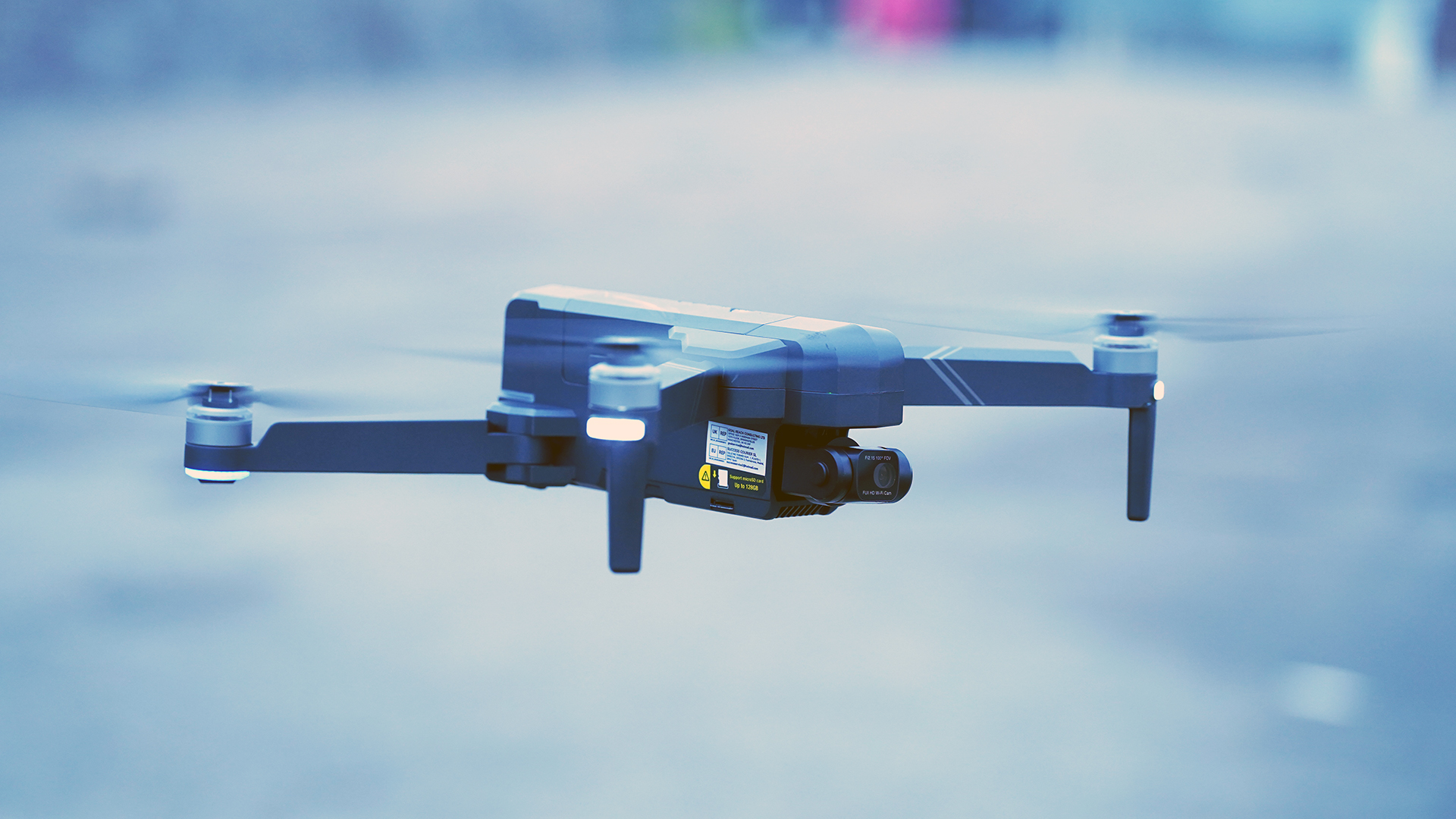
The Ruko F11 GIM2 beginner drone has its strengths and weaknesses. It's somewhat heavy, and the camera performance is okay at best, but it's easy enough to fly, and thanks to the spare battery and carry case included in the price, it's a decent value-for-money proposition.
-
+
Robust construction
-
+
Carry case and spare battery included in the basic package
-
+
Larger body makes the drone more stable in the wind
-
+
Responsive controls
-
-
Video performance isn't great
-
-
Retrieving videos from memory card is confusing
-
-
You need an Operator ID in the UK to fly it
Why you can trust T3

Ruko F11 GIM2 review in a nutshell: a popular beginner-friendly drone that's easy to fly but only provides passable camera footage. It might be worth a try if you come across a cheap deal on Black Friday (or beyond).
Ruko might not be as well-known as DJI – after all, DJI is the best drone brand – but they sell plenty of drones via third-party retailers such as Amazon. It's no surprise, as Ruko's drones are wallet-friendly enough to entice beginner drone pilots. Should Ruko be considered one of the best beginner drone brands? I was determined to find out.
After giving the similarly affordable Potensic Atom SE and the somewhat more premium yet beginner-friendly DJI Mini 2 SE a try, I was curious to find out what the F11 GIM2 had to offer to convince people (and me). After a couple of weeks of testing, I have some good news and some bad news, but overall, I'm not unhappy with the Ruko F11 GIM2. Read my full review below to find out more.
(First reviewed September 2023)
Ruko F11 GIM2 review: Price and availability
The Ruko F11 GIM2 is available to buy now at Ruko, Amazon UK and Amazon US for a recommended retail price of £499.99/ $619.99. AU price and availability TBC.
This might sound like a lot of money – it is – but the default version of the Ruko F11 GIM2 drone is what most other brands would call the Fly More edition, which means you get an extra battery, a carry case, and a few other accessories included.
The drone comes in three different versions in the US: 2B, 3B and 4B. These add one extra battery at each step (3B: three batteries, 4B: four batteries) and other accessories like a landing mat.
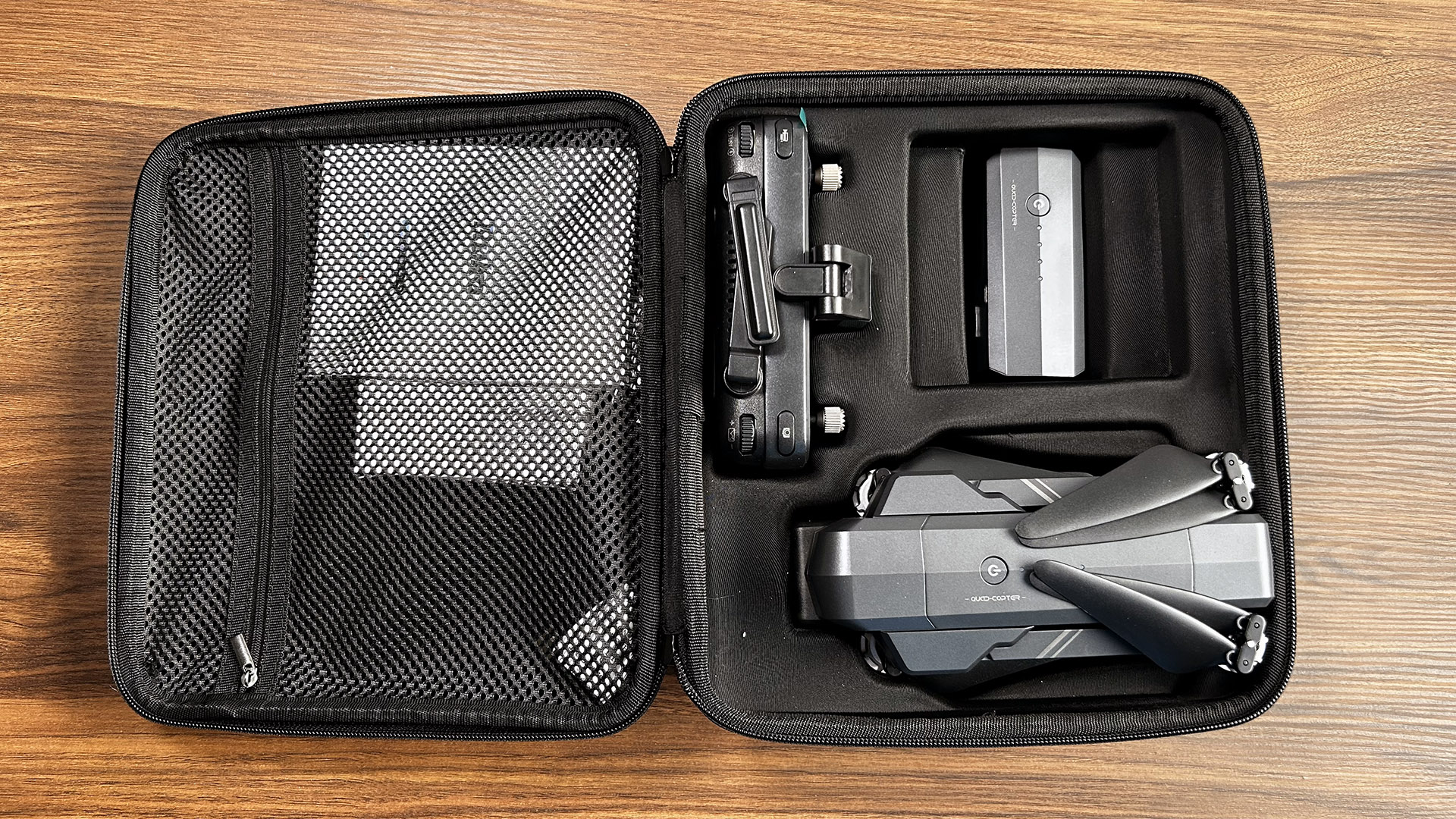
Ruko F11 GIM2 review: Specifications
- Weight: 20.6 oz/ 584 grams
- Max Flight Time: 28 minutes (per battery)
- Dimension: 17.7 × 15.9 × 3.1 in (unfolded)
- Camera: 4K ultra HD, 5x optical zoom camera
- Max photo resolution: 3840×2160P, JPEG
- Max video resolution: 4K @ 30fps
- Highest image transmission quality: 720P@25fps
- Image Stabilization: 3-axis gimbal (2-axis mechanical gimbal plus EIS anti-shake) records 30fps video
- Camera Adjusted Angle: -80°+0°
- Memory card support: max 128GB (not Included)
- Max Flight Distance: 9,842ft/ 3,000m (unobstructed)
- Max Transmission Distance: 9,842ft/ 3,000m
- Max Height: 393ft/ 120m
- Wind resistance: Level 6
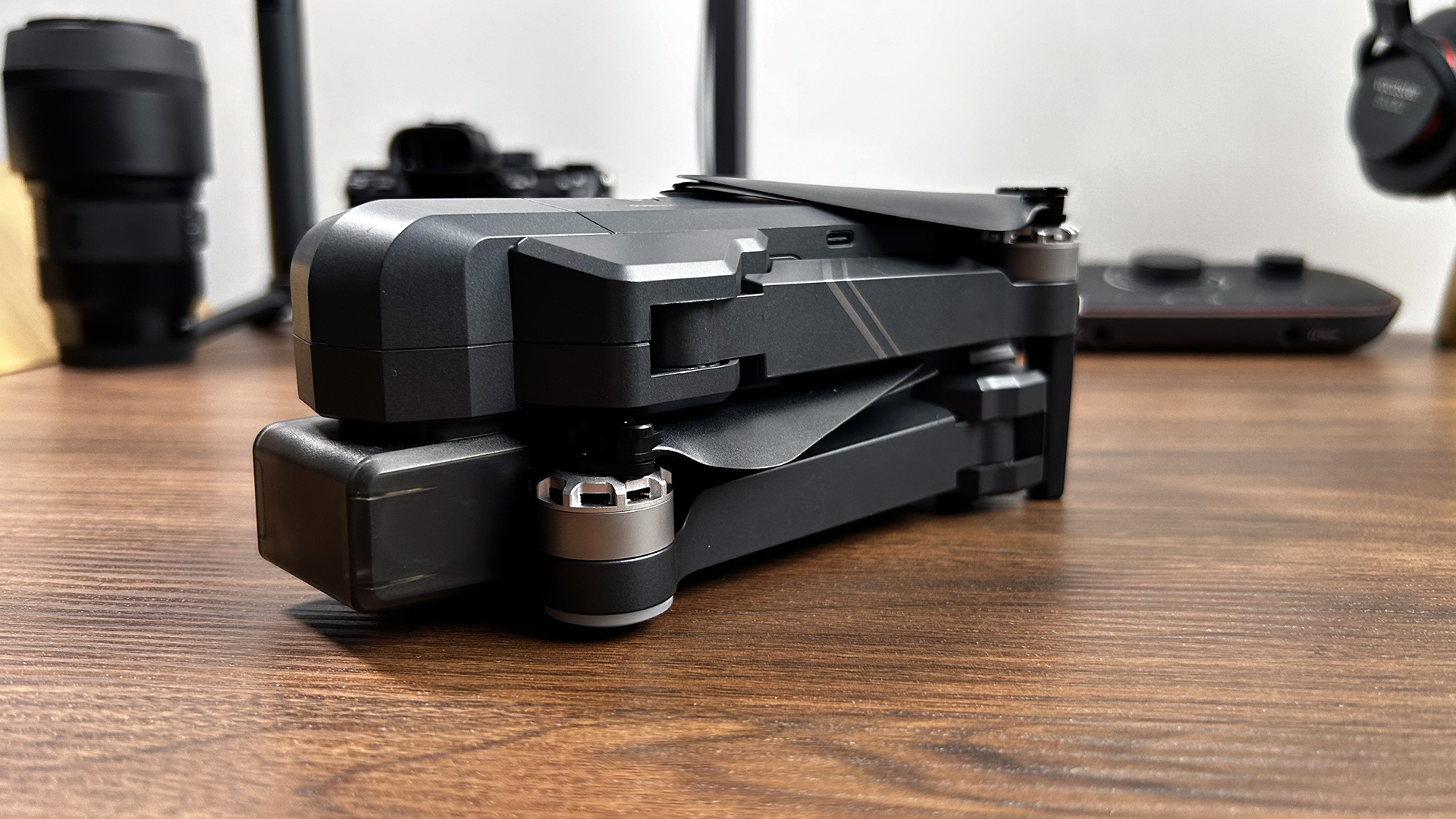
Ruko F11 GIM2 review: Design
The Ruko F11 GIM2 is well over the magical 249-gram limit (it weights 584 grams) that allows you to fly a drone with only an Operator ID in the UK, which somehow limits its appeal among beginner pilots who might not feel like studying for the Flyer ID test just so they try Ruko's drone. Thanks to the drone's large size, the Ruko F11 GIM2 feels substantial in the hand but not intimidating.
The drone itself has a considerably straightforward design and is foldable, making it easier to transport it around. The included carry case is also a handy accessory, allowing you to haul the F11 GIM2 in the most convenient fashion possible. One thing I found strange is that the carry case handle is on the bottom of the carry case, so to speak, meaning it's pretty easy for everything to fall out of it if you forget to zip it all the way up.
The removable battery is located on the top of the drone, and interestingly, the on/off button and the LED indicators are also positioned here. It's not like anyone would want to (or be able to) fly the drone without the battery, but I found this positioning somewhat peculiar. It's not a hindrance, though.
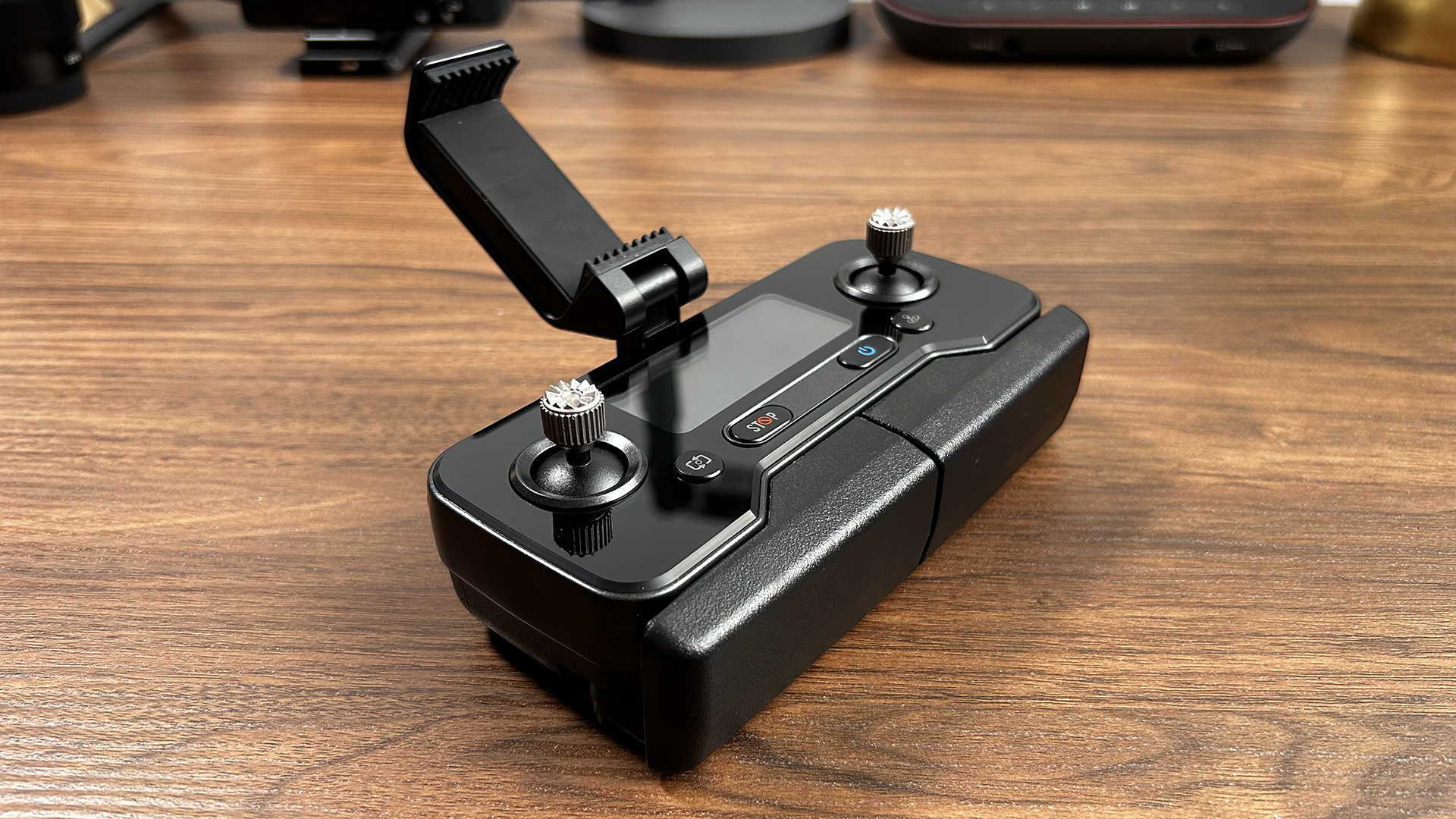
Interestingly, the controller also has a foldable design. You get the usual folding antennas, but the bottom of the controller folds out, too, to improve ergonomics. I have large hands, so I enjoyed this feature, although I think it would've made some sense to integrate the smartphone clamp in this area (between the two arms). Again, this isn't a deal-breaker issue; more of an observation.
The quality of the controller is fine. It's a bit clunky, and the plastic feels a bit cheap, but it didn't break or creak the wrong way during the testing period. The display is easy to read, although the user interface isn't the most mind-blowing thing I've ever seen. There is a display, so that's something!
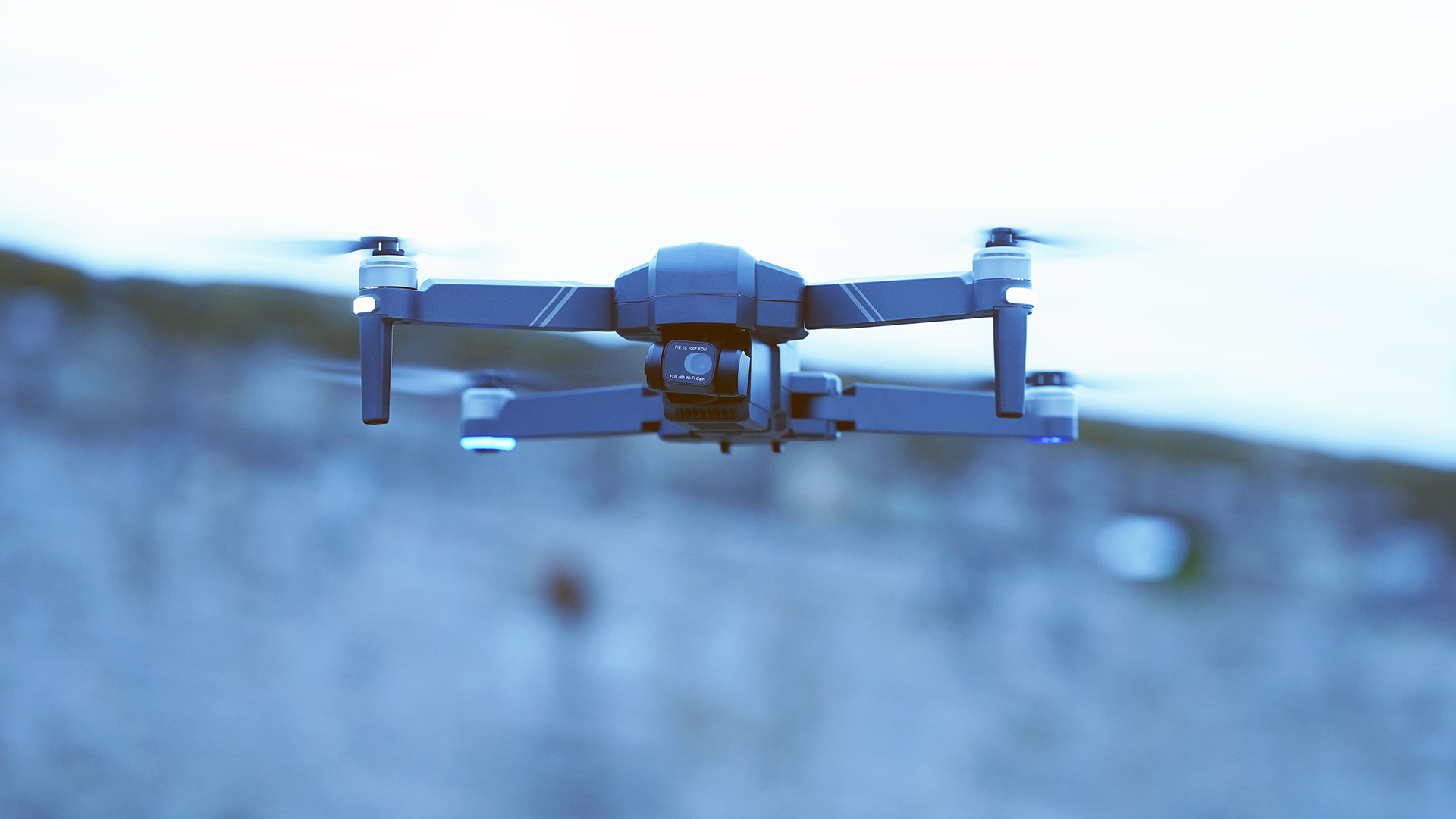
Ruko F11 GIM2 review: Flight performance
I'll start this section with a bit of a confession: My first attempt at trying to fly the Ruko F11 GIM2 ended up with the drone flying into the sea wall situated not too far from me. In hindsight, I could've been farther away from any obstruction, but considering I was out in the open, I thought the GPS would be able to hover the drone steadily.
I learned the hard way that's only partially the case. As the F11 GIM2 took off, it started wobbling, moving around in larger and larger swings. In an attempt to stabilise it, I started fiddling with the controls, but I couldn't stop the movement, and the drone flew into the wall, damaging one of the rear arms in the process.
Needless to say, I had to abandon the test to examine the damage. Just to be sure, I changed all the propeller blades and had a look at the damaged area. It all seemed okay, so the day after the first flight, I took out the Ruko F11GIM2 again and managed to fly the drone until the battery almost depleted. In essence, durability is on point!
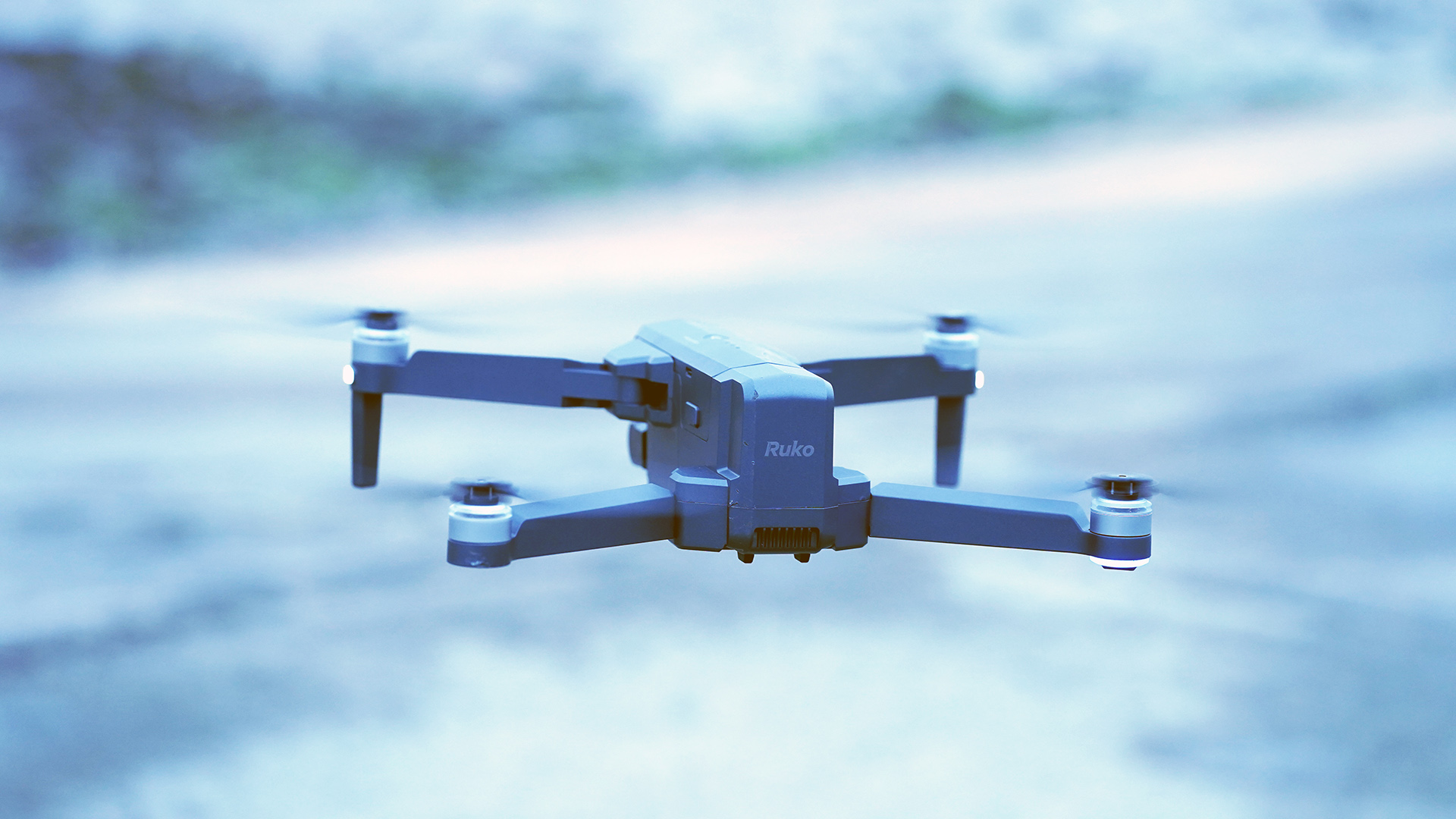
Once it's up in the air, it's easy to navigate the Ruko F11 GIM2, thanks to the heavier body that seems to resist wind better than smaller units. There are three flying modes, allowing you to perform a wide range of manoeuvres. I found the controls responsive and enjoyed flying the drone a lot.
As expected from a drone these days, the Ruko F11 GIM2 has pre-programmed flying modes, such as Follow Me, Waypoint Flight and GPS Auto-return Home. Some of the cooler auto features found on beginner DJI models (e.g. Helix) aren't available on the Ruko F11 GIM2, but it's to be expected.
When I tried to see how far I could fly out the drone before the connection dropped, it went about 750m/ 2,460 ft before I had to stop. I realised there was a (not awfully tall) building between me and the drone, which probably affected the signal. Further testing is required to see if the drone can actually fly close enough to the claimed 3km maximum distance.
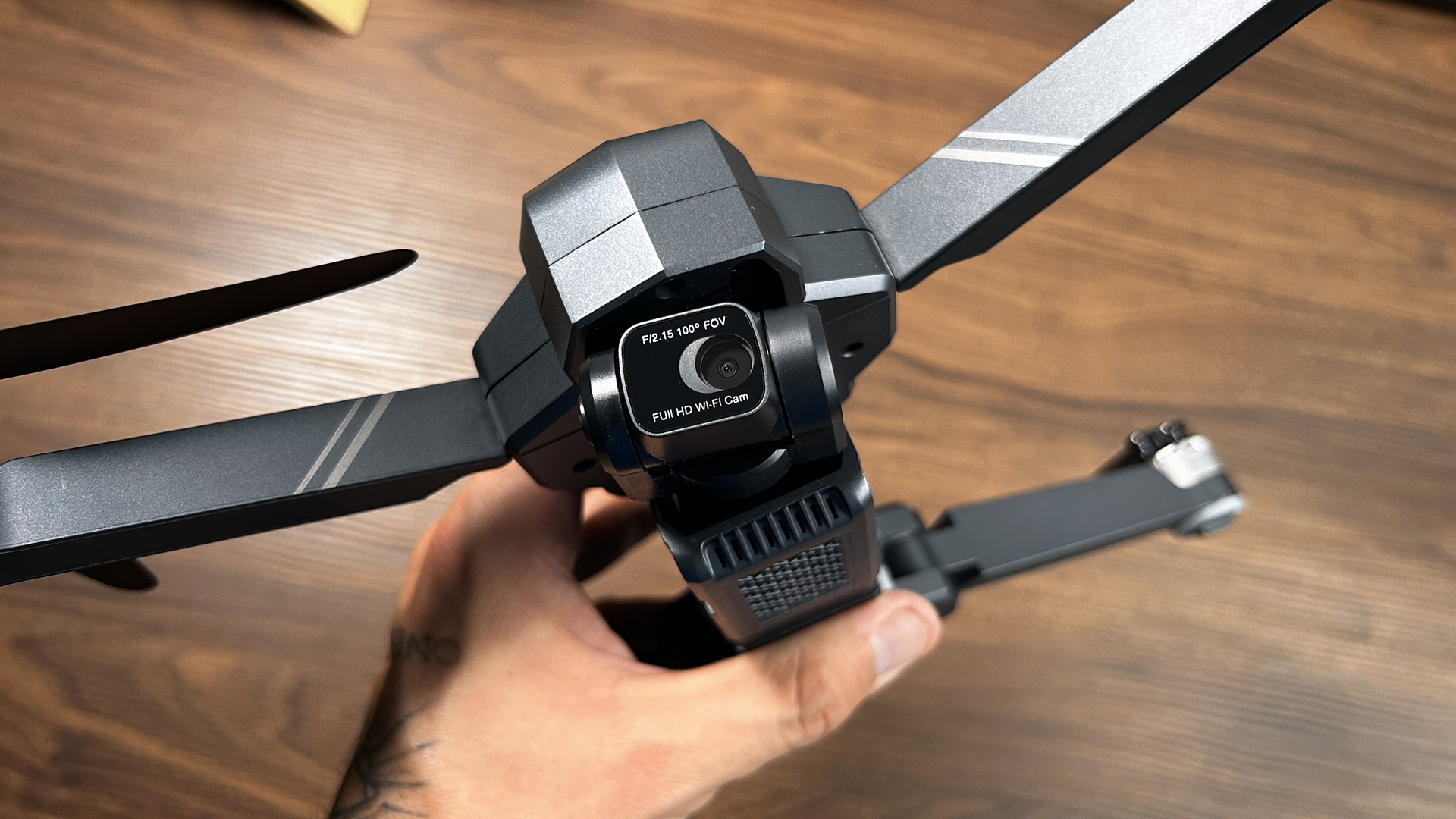
Ruko F11 GIM2 review: Camera performance
To be transparent, I didn't expect the Ruko F11 GIM2 to be able to capture stunning videos and photos. With its 2.5-axis design (2-axis mechanical gimbal plus EIS anti-shake) and supposed 4K max resolution, footage from the F11 GIM2 should look okay, yet I expected a similar experience to the Potensic Atom SE, which also has a 4K camera but looks only so so.
And indeed, the camera performance is far from terrible, but it's nothing special, either. The main issues are resolution, framerate, and transmission rate. Most photos and even some of the videos look okay on smaller screens (i.e. smartphones), but as soon as you watch either of those on a laptop, you'll soon see those artefacts cropping up on the footage.
One strange feature I encountered was that the images and videos appeared in the phone's camera roll automatically. At first, I thought this was convenient (and quite cool), but later realised these videos weren't the actual videos, only low-resolution previews automatically sent by the drone. To download the videos from the drone's memory card, you have to open the app, go into the gallery, select the memory card icon at the top and download the videos manually.
This might be confusing to new drone users, as they might think the videos cropping up on their camera roll are the real deal. Photos are fine as they are, as far as I can tell, so that's nice.
Two things that the Ruko F11 GIM2 has going for it are flight stability and anti-shake. Although I found it hard to control the angle of the camera smoothly, thanks to the heavier, more wind-resistant body and the EIS anti-shake tech, the videos aren't as shaky as some similar footage captured with smaller drones.
I know camera performance will forever be the weak spot of more accessibly priced drones, but it shouldn't be, especially in the case of the Ruko F11 GIM2, which is a heavier drone, so it could support a larger camera unit. Sure, you can mount an Insta360 GO 3 on the drone and capture much better footage – many drone pilots did this with the Insta360 GO 2, and there is even a special, third-party mount designed for the purpose.
At the same time, you'd think Ruko could come up with a similar solution by adding a decent optical unit to the drone. It doesn't even have to be 4k; the Insta360 Go 3 above gets away with only capturing videos in 2.7K, yet it looks so much less noisy than the Ruko F11 GIM2's 4K footage. It would also be awesome if there were a smaller resolution mode with a higher frame rate (50/60 fps).
Ruko F11 GIM2 review: Photo gallery









Ruko F11 GIM2 review: Verdict
The Ruko F11 GIM2 beginner drone has its strengths and weaknesses. It's somewhat heavy, and the camera performance is okay at best, but it's easy enough to fly, and thanks to the spare battery and carry case included in the price, it's a decent value-for-money proposition.
I know that the drone is often on offer, and if you come across it for a discounted price – and have the appropriate licence to fly it – you might as well give it a try. Don't expect the Ruko F11 GIM2 to provide stunning videos similar to DJI drones, though, especially if you're trying to create content for social media (i.e. vertical videos).
However, if the flying experience is as important to you as the quality of the footage, and you haven't got tons of cash to spend on your new hobby, you should keep your eyes peeled for a cheap Ruko drone offer (roll around, Black Friday!).
Ruko F11 GIM2 review: Also consider
The DJI Mini 2 SE might be a better option if you want a lighter drone with a more sophisticated companion app. The feature set and performance of this dinky drone are beyond reproach at this price point. You miss out on some camera features compared to the Mini 2, but the DJI Mini 2 SE offers more than enough functionality for beginners. Read my full DJI Mini 2 SE review.
The pocket-sized Autel Evo Nano is equipped with a 1/2-inch camera for ravishing 4K footage and 48-megapixel stills, plus three-way obstacle avoidance for added in-flight safety. It's the first non-DJI camera drone to win T3's full five-star accolade. And deservedly so. Read our full Autel Evo Nano review by the ever-so-wonderful Derek.
Sign up to the T3 newsletter for smarter living straight to your inbox
Get all the latest news, reviews, deals and buying guides on gorgeous tech, home and active products from the T3 experts

Matt Kollat is a journalist and content creator who works for T3.com and its magazine counterpart as an Active Editor. His areas of expertise include wearables, drones, fitness equipment, nutrition and outdoor gear. He joined T3 in 2019. His byline appears in several publications, including Techradar and Fit&Well, and more. Matt also collaborated with other content creators (e.g. Garage Gym Reviews) and judged many awards, such as the European Specialist Sports Nutrition Alliance's ESSNawards. When he isn't working out, running or cycling, you'll find him roaming the countryside and trying out new podcasting and content creation equipment.
-
 What new TV Licence rules mean for Netflix and Prime Video subscribers
What new TV Licence rules mean for Netflix and Prime Video subscribersHint: nothing yet, but that may change soon
By Britta O'Boyle Published
-
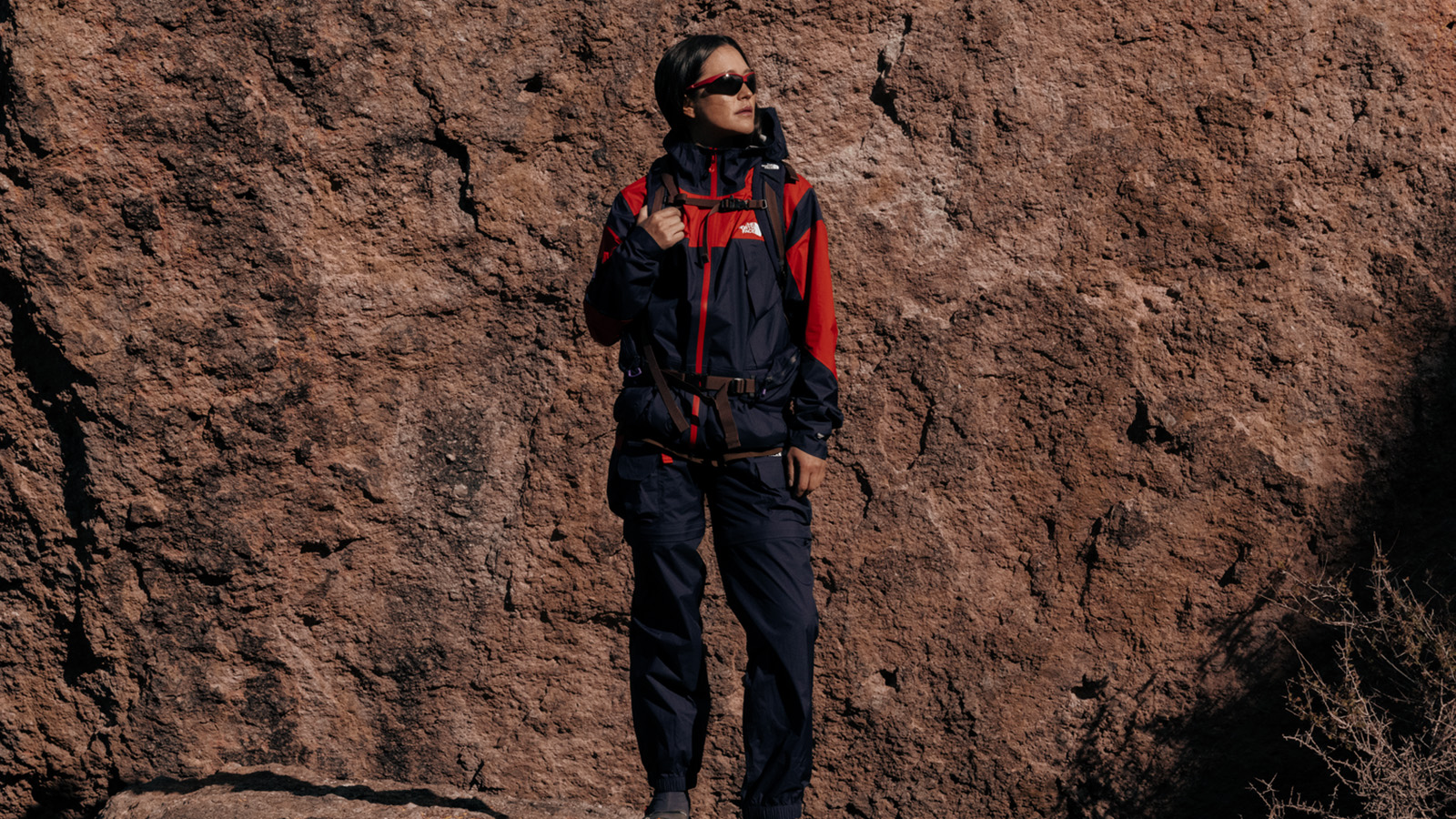 The North Face and UNDERCOVER are back to zen-slam the trails with SOUKUU Season 4
The North Face and UNDERCOVER are back to zen-slam the trails with SOUKUU Season 4Meditative mountain gear? You better believe it – SOUKUU SS25 is part trailwear, part philosophy, and all fire.
By Matt Kollat Published
-
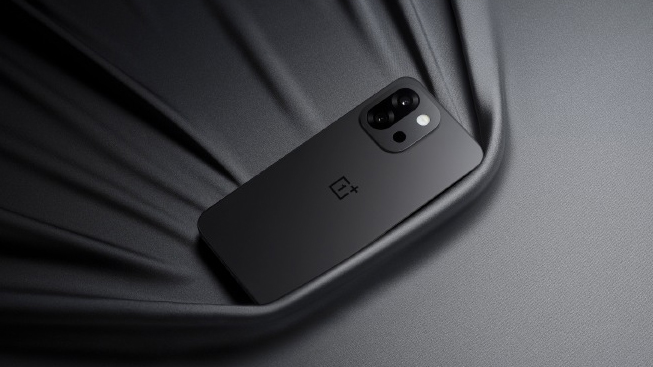 OnePlus 13T design leaked with iPhone-like design
OnePlus 13T design leaked with iPhone-like designA flurry of leaks have revealed the OnePlus 13T in the flesh
By Chris Hall Published